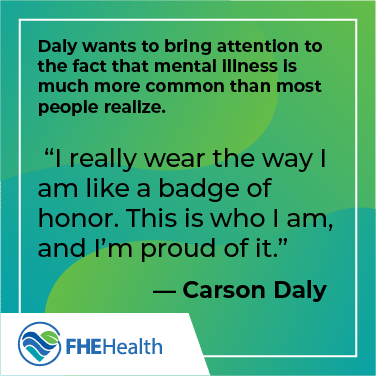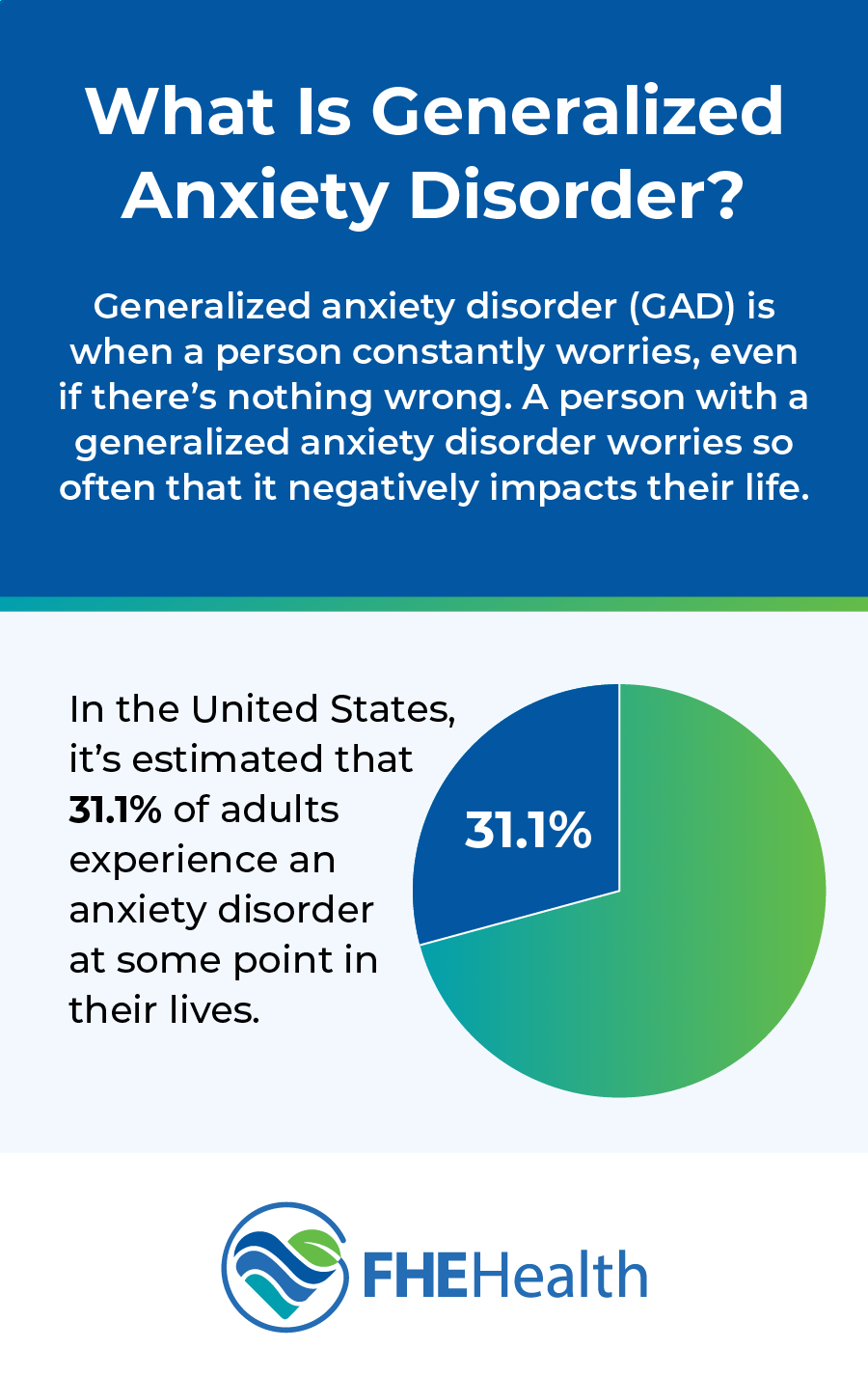
We sometimes think of celebrities as perfect, godlike beings with no problems. But famous people are just like us and just as susceptible to struggling with mental health conditions. It can be incredibly helpful when celebrities we idolize come forward and share their mental health struggles. It helps to reduce the stigma around mental illness. Recently, Carson Daly’s depression and anxiety have been a topic of discussion as he publicly shared his mental health journey.
Carson Daly’s Depression and Anxiety
 In 2018, television host Carson Daly opened up about his generalized anxiety disorder (GAD). He shared that his first panic attack happened before he was about to host an episode of the MTV show Total Request Live. He remembers the incident vividly, saying, “I had a hard time breathing. I was terrified for no apparent reason.”
In 2018, television host Carson Daly opened up about his generalized anxiety disorder (GAD). He shared that his first panic attack happened before he was about to host an episode of the MTV show Total Request Live. He remembers the incident vividly, saying, “I had a hard time breathing. I was terrified for no apparent reason.”
Daly shares that his anxiety dates back to his childhood. He says his father died when he was 5, which led to him always being a worrier as a child. Daly had an ulcer in high school and has felt nervous his entire life.
As he entered adulthood, he left his home in California and moved to New York City. From the outside, it seemed that Daly was living a successful dream life as his career took off. But behind the scenes, his anxiety was worsening. He remembers having a panic attack that felt so bad he mistook it for a heart attack and went to the hospital.
Daly wants to clarify that it’s not his high-pressure job or the limelight that’s triggering his anxiety. He’s had severe panic attacks while enjoying a day at the playground with his wife and kids. His anxiety is present in his daily life, even in seemingly calm moments.
The turning point for Daly was when he shared his experiences with a friend. The friend, who also struggled with anxiety, recognized Daly’s symptoms. They explained to Daly that he might have GAD and encouraged him to get a diagnosis because help was available.
View this post on Instagram
What Is Generalized Anxiety Disorder?
 Carson Daly’s anxiety disorder is one of the most common mental health conditions out there. In the United States, it’s estimated that 31.1% of adults experience an anxiety disorder at some point in their lives.
Carson Daly’s anxiety disorder is one of the most common mental health conditions out there. In the United States, it’s estimated that 31.1% of adults experience an anxiety disorder at some point in their lives.
Generalized anxiety disorder (GAD) is when a person constantly worries, even if there’s nothing wrong. Everyone can worry sometimes, but a person with a generalized anxiety disorder worries so often that it negatively impacts their life. Someone with GAD lives in a state of constant worry, dread, and fear.
Living with GAD can disrupt a person’s life in many ways, from their relationships and work to their ability to enjoy everyday life. Luckily, there are effective treatment options that can help manage the symptoms of GAD.
Carson Daly’s Anxiety Treatment
There are many options when it comes to treating anxiety and depression. Daly has spoken openly about the treatment approach that’s worked for him. He chose cognitive therapy, where his therapist teaches him about the disorder, how it works and tools to work through the anxiety. Muscle retention relaxation is a skill Daly has learned to get him through anxious moments.
What Made Carson Daly Share His Mental Health Journey
Carson Daly believes his anxiety symptoms are painfully apparent to anyone who knows how to pick up on them. He says that while he’s hosting The Voice, you can see that he never stands still, and this is a manifestation of his anxiety.
But he isn’t embarrassed about his mental health condition and doesn’t feel the need to hide it. He says, “I really wear the way I am like a badge of honor. This is who I am, and I’m proud of it.”
Daly also wants to bring attention to the fact that mental illness is much more common than most people realize. In interviews, he’s mentioned that, from the outside, he might look like a celebrity with a perfect, happy life, but it’s all appearances. He struggles with problems, just like everyone else.
He’s started openly discussing it because he believes it’s essential to discuss mental illness so more people feel comfortable getting help. Daly stresses that anxiety isn’t something that comes with an easy one-size-fits-all solution and there’s no magical pill. Instead, people have to do some personal work to learn coping mechanisms and find out what works for them.
He also hopes to inspire others to seek help. Daly believes he started seeing much more progress when he received a diagnosis. A diagnosis allows a person to understand what they’re going through, conduct research, get help, and share with others. Anyone who can find the courage to get a diagnosis can get the support they need to manage their symptoms.
Anxiety treatments
 There are many options for treating anxiety.
There are many options for treating anxiety.
Therapy
Psychotherapy, also known as talk therapy, is one of the most effective ways to treat anxiety. More specifically, cognitive behavioral therapy is beneficial for teaching patients how to understand anxiety and learn skills to get through anxious moments.
Prescription medication
Several types of prescription medications can be used to treat anxiety symptoms. Some of the most common options are:
- Antidepressants
- Buspirone
- Benzodiazepines
Alternative treatments
There are additional forms of treatment that can help reduce anxiety symptoms. It’s important to note that these treatments shouldn’t be considered a substitute for therapy or medication but should be viewed as an addition to therapy:
- Physical exercise
- Journaling
- Meditation or yoga
- Support groups
Everyone’s treatment needs to be personalized to their needs and preferences. Some people may respond well just to therapy, while others might need a combination of therapy and medication. It can take some time to find the right combination for you. Once you have the right combination, you should see the symptoms of your anxiety lessen or disappear and life should feel lighter.
Treat Your Anxiety at FHE Health
If you’re struggling with anxiety, know that you don’t have to live with unmanaged symptoms. Anxiety is a highly treatable condition, and help is available. FHE Health has helped thousands face their mental health and substance abuse issues. Contact FHE Health today to learn about our mental health treatment programs and how we can help you get your anxiety under control.






